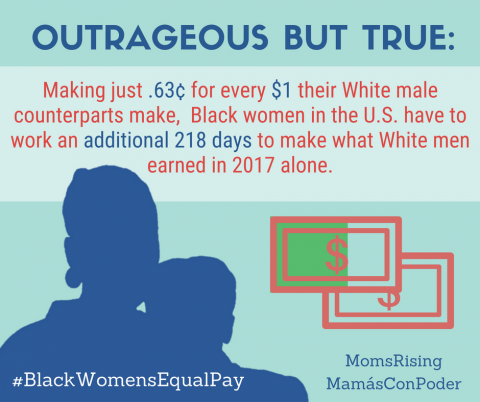
[Image with text: OUTRAGEOUS BUT TRUE: Making just 63 cents for every $1 their White male counterparts make, Black women in the US have to work an additional 218 days to make what White men earned in 2017 alone.]
QUICK SIGNATURE for Black Women's Equal Pay Day!
It’s happening. Again! And it’s not good.
I’m talking about Black Women’s Equal Pay Day – August 7th. This is the day that lifts up the outrageous fact that Black women in the United States earn only 63 cents on the dollar compared to White men. The wage gap between White men and Black women hasn’t budged since last year and the pay gap between White women and Black women is the fastest growing income inequality today.
It’s 2018 and this is simply unacceptable.
*URGE CONGRESS to support policies that help close the wage gap!
All women, especially mothers, experience the wage gap. However, women and mothers of color are hit the hardest by the persistence of racist and sexist unequal pay.
It’s outrageous. And to fight back you’ve got to know the facts. Black women are now the most educated group in the United States, yet Black women who work full-time, year-round, face a 37 cent wage gap.
Black mothers are paid even less. On average across the country, Black mothers earn 54 cents on the dollar compared to White, non-Hispanic fathers.
Black women and mothers are acing direct discrimination on a number of levels--and this is not okay. On top of the wage gap, there’s a lot at stake right now for Black women and mothers in our nation.
For instance, deaths related to childbirth and pregnancy are rising in the United States, and are especially high among Black women. A recent study showed that “the impacts of institutional racism and sexism compromise women’s health across time, leading to poorer outcomes for African American women and infants.”
To be clear, Black women are not only experiencing increased pay discrimination but are also experiencing increased discrimination in health care as well as targeting and profiling from the criminal justice system every day. This racial bias starts early – really early – when children of color are more likely than White students to be suspended from school.
And racial bias follows Black women throughout their lives. For example, Black women accounted for 53.4 percent of all women stopped by the police even though Black women only make up 12.7% of the female population in the US. Further, studies show that Black women are three to four times more likely to be targeted by police and incarcerated than White women.
The racism doesn’t stop there and impacts the whole family. Despite myths to the contrary, Black fathers are more present and involved with their children than any other group of fathers. Having said that, the fact is that racial profiling, mass incarceration, and the fact that young Black men are 21 times more likely to be killed than young White men means that many Black women and mothers are left to pick up the pieces and serve as sole breadwinners for their families.
With more than four million family households in the United States headed by Black women, it’s imperative that we close the Black women’s wage gap.
All of this is to say that the Black women's wage gap is the result of and perpetuated by not only sexism but also by racism. And there are over 23 million Black women in America who are dealing with this wage gap.
When Black women are paid fairly, there will be a ladder to economic security and greater opportunity to develop a financial cushion to address child care and other family emergencies. Closing the wage gap for Black women would mean that on average a Black woman working full-time, year-round would have enough money for approximately: 2.5 more years of childcare, nearly 2.5 additional years of tuition and fees for a four-year public university or the full cost of tuition and fees for a two year community college, 155 more weeks of food for her family, 14 more months of mortgage and utilities payment, or nearly 22 more months of rent.
** And be sure to share this blog post or post the link below to social media, because we also have to arm people with the facts (yes, those still exist) in order to combat the Black women’s wage gap.
https://action.momsrising.org/sign/BlackWomensEqualPay2018/?t=blog



The views and opinions expressed in this post are those of the author(s) and do not necessarily reflect those of MomsRising.org.
MomsRising.org strongly encourages our readers to post comments in response to blog posts. We value diversity of opinions and perspectives. Our goals for this space are to be educational, thought-provoking, and respectful. So we actively moderate comments and we reserve the right to edit or remove comments that undermine these goals. Thanks!